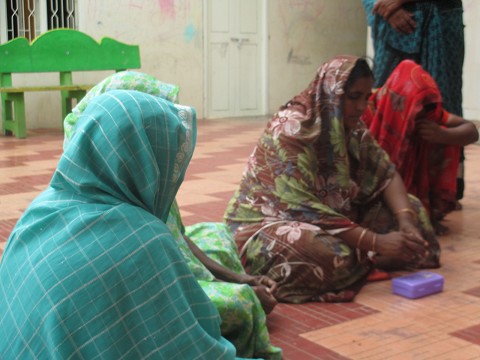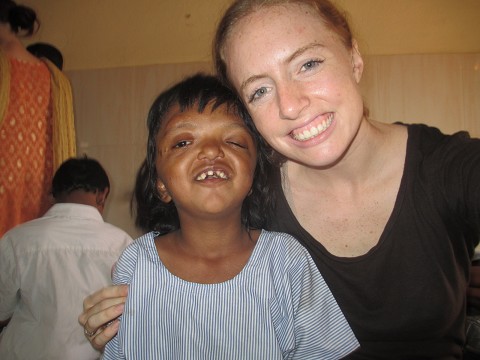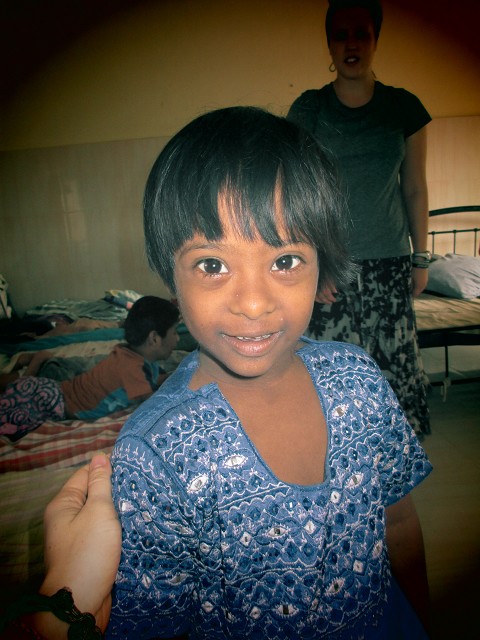It’s our final week of ministry here in India. For those of you who don’t know, our ministry this month has been working at Sarah’s Covenant Homes, an orphanage for special needs children.

SCH was founded in 2008 by Sarah Rebbavarapu. Some of the stories of how the kids were brought to SCH or where they came from before will break your heart. One little girl, Jackie, was left in a rice bag to die because she has disfigured hands and feet. The people of India do not look lovingly on those with special needs. They are considered to be the lowest of the low, unimportant and completely unvalued. Before coming to SCH, these kids were abandoned and alone, with no one loving on them. Now, they have a home with other children, food with good nutrition three times a day, medical care when needed and even the opportunity to go to school, if their disabilities allow for that.
Before arriving at SCH, we didn’t really know what to expect. We knew the living and medical conditions were not going to be at American standards, but also knew that compared to where these kids came from, it was practically perfect. I anticipated that working with the children was going to be physically and emotionally draining. I didn’t expect one of the more difficult things for me would be to work with Ayahs or caretakers.

Like I said, in Indian culture, people with special needs or disabilities are often neglected. This is because often these disabilities are looked on like a curse. While Sarah and the SCH staff does a excellent job of loving on and caring for these kids, there is still a lack of love evident in the Ayahs, the ones who are actually with the kids the most. The SCH staff has been working diligently to transcend the cultural mindsets that the Ayahs have grown up with and instill a setting of love for the kids, but this is a big battle.
Working as an Ayah, would probably be more than I could handle. They all work 24/7, get four days off a month and are in charge of two or three special needs children each, more than I could do. Some of the Ayahs love their particular children as much as they would their own children. For some, it is easy to see that this is simply a job that they don’t have a passion for.
The most difficult times for us were when we see an Ayah treating a child, especially one with special needs, in a way that is so cross cultural to our own. We have grown up with the idea that each baby is precious, you hold them when they cry, you change a dirty diaper immediately and you cherish them in every way. India is not like that. Children are not cherished in the same way here.

We were given permission at the beginning of the month to correct the Ayahs if we see behavior that is harmful to the children. But this has brought up some interesting challenges for us, knowing how to balance loving the Ayahs while loving the children. How to seek justice for one and still show grace for the other.
My “push me over the limit” moment was when I saw a young teenager drag herself onto the bathroom floor. She can’t walk, so she uses her arms to get around by pulling her body behind her. Because of this, she has sores on the front of her legs. The sores are bandaged, but she doesn’t have the ability to walk all the way into the squatty potty to go the bathroom, so she just pulled her pants down, peed and then put her pants back on. The urine was obviously now on the bathroom floor, so she sat in the urine to get her pants back on and then she pulled herself through it to get out of the bathroom. This, of course, soaked the bandages with urine and her sores were now covered in it. While all of this was going on, the Ayahs in the room didn’t even notice. It was common place for them. My pointing and yelling and gesturing that she needed to be helped to the bathroom did nothing.
I picked her up, pee and all, and took her into the workroom where I changed her bandages, cleaned out her sores, re-dressed her in clean clothes and then demanded that she be put in diapers regularly so she wouldn’t get urine on her sores.
The Ayahs protested, but in the end I got my way and she got a diaper. But did the Ayah understand? Will she change her ways? Will she continue to make sure this girl has a diaper on when I am long gone? Probably not, because her heart wasn’t changed to see the problem. She saw a waste of diapers, because the girl could get herself into the bathroom by herself. She didn’t see the things I did, like infection control, because she was not raised to protect against those things like I was.
It was an incredibly frustrating, yet eye opening experience.
My team have all had encounters like this at some point in the past two weeks, it brought us to the point that we knew we had to find some way to reach the Ayahs before we left. You see, broken people cannot care for broken people. And the Ayahs, are broken.
Most of them are widows, very much alone and this was the only job they can get. Many of them might claim christianity, but few have had their hearts captured by Christ. We knew going in that we can’t change the Ayahs from their life long culture in three and a half weeks. It’s not possible. But, we thought, if Jesus could meet them, if Jesus could shown them how much He loves them, maybe their hearts can be changed. Maybe once they have whole hearts, they can look on these kids with His love instead of their own. Maybe, just maybe, His love is enough for any and all change that place needs.
So this next week, we are setting out to make a lasting difference in their hearts. My team will be taking over the morning bible study time, using that as an opportunity to show the Ayahs that we are here for them as much as the kids. We will then be using our afternoons as training sessions, setting standards of care for each room. Before each training, we will be praying over each Ayah, asking the Lord to bless them and lift them up.
I am so excited for this next week, and so is my team! We are attacking the Ayahs with love! We have a confident faith that this love of the Father will go into their hearts and that soon, this love will pour from them onto the children.
If you would like to help further the work at SCH and continue loving on these kids, ones that have been so unloved most of their lives, please visit schindia.com. It takes 20,000 USD to run the orphanage for over 100 kids. This amount covers all their medical care, nutrition and education. It is a ministry worth getting behind, because without SCH, these kids would literally have nowhere to go.









